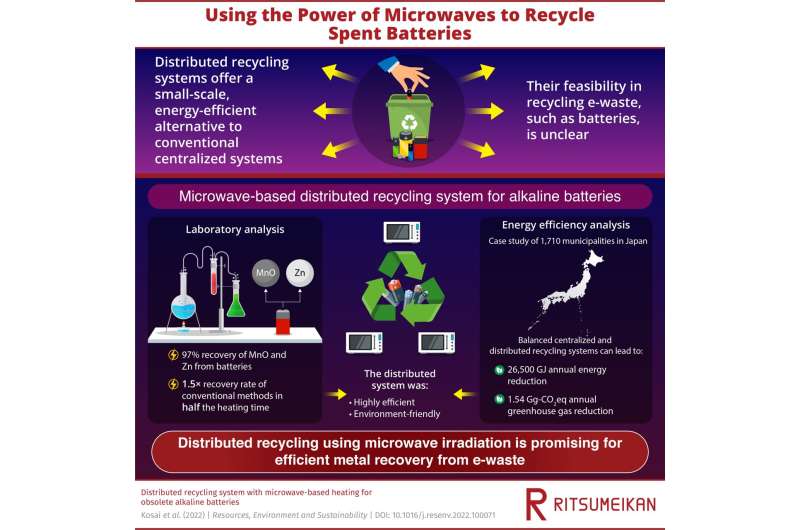Radiation for responsible recycling: A distributed, microwave-based method to recycle batteries

The global culture of mass production and consumption has resulted in a monumental increase in the amount of waste being generated today, indicating an unmet need for better recycling systems. Traditionally, waste is collected locally and processed at large-scale recycling facilities in a centralized location. While this treats a large amount of waste at once, high transportation costs and energy consumption remain a big problem with the method.
Distributed recycling systems involving small-scale recycling facilities offer a sustainable alternative to conventional recycling systems. Such a system can greatly reduce the energy requirements for transportation and has the potential to increase recycling rates. While this type of system is still in its infancy, many studies have explored its use in recycling plastics, photovoltaic waste, and wastewater, with particularly promising outcomes in distributed plastic recycling. Therefore, the potential for distributed recycling systems needs to be explored to solve the global issue of waste management.
In a new study, researchers from Ritsumeikan University, Japan, proposed a new small-scale distributed recycling system for used batteries. "The feasibility to decentralize the recycling of e-waste needs to be analyzed, considering the different characteristics of each municipality. In this study, our focus is on obsolete alkaline batteries as waste product to be treated in a distributed recycling system," explains Prof. Shoki Kosai, a member of the research team and the first author of the study. Their new system employed microwave irradiation, which offers selective, rapid heating and reduced energy consumption compared to furnace-based heating. The team's findings were published in Resources, Environment and Sustainability.
First, the researchers conducted an empirical study to explore the usability of this microwave-based technique in recycling spent alkaline batteries. Then, they conducted an analytical case study to examine the effectiveness of distributed recycling systems in Japan. A total of 1,710 municipalities in Japan were considered in the study, which used energy consumption and greenhouse gas emissions as metrics for testing the effectiveness of the proposed recycling system.
The results of the empirical study showed that microwave-based heating achieved a recovery rate of 97% of manganese oxide and zinc from the alkaline batteries. This recovery rate is 1.5 times more than conventional electric furnace-based heating, while taking only half the time. The analytical study also revealed highly optimistic results, as the team noted that a balance between centralized and distributed recycling systems can reduce annual energy consumption and greenhouse gas emissions across Japan by 26,500 GJ and 1.54 Gg-CO2eq, respectively.
The concept of decentralization is a new notion among recycling systems. In this regard, the findings of this study provide a good starting point to explore distributed recycling systems using microwave irradiation for metal recovery. "Through the adoption of this system, areas where natural resources are not available will gain the opportunity to become suppliers of secondary resources. This system could also remedy the problem of metal recycling in developing countries," concludes Prof. Kosai.
More information: Shoki Kosai et al, Distributed recycling system with microwave-based heating for obsolete alkaline batteries, Resources, Environment and Sustainability (2022). DOI: 10.1016/j.resenv.2022.100071


















